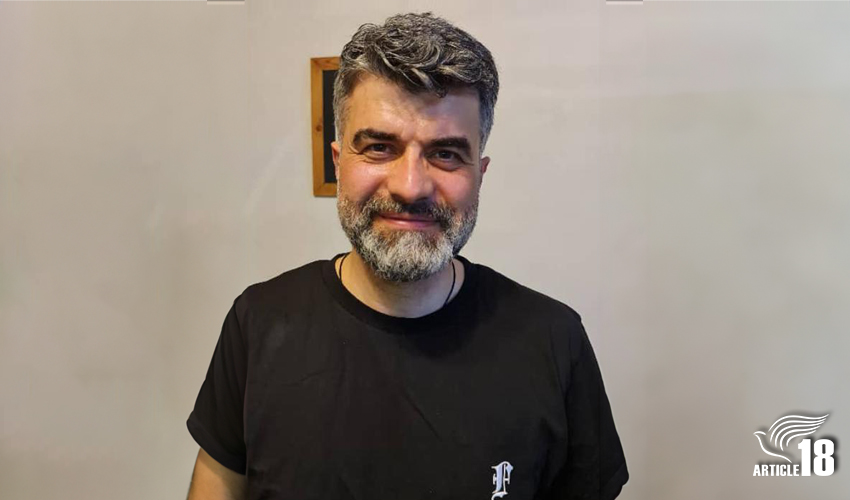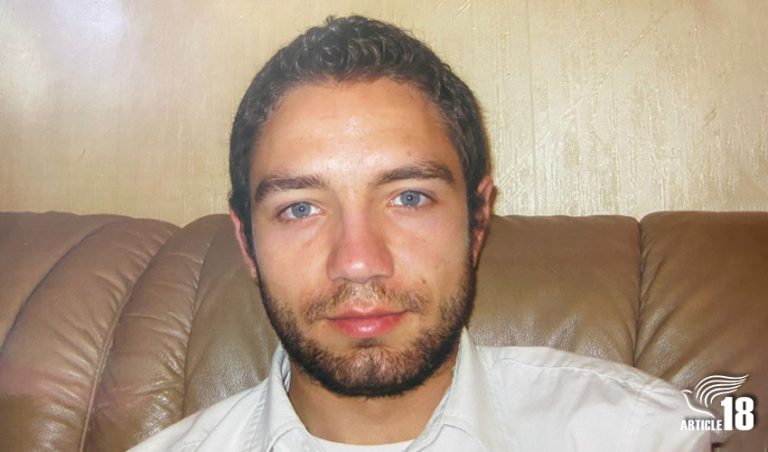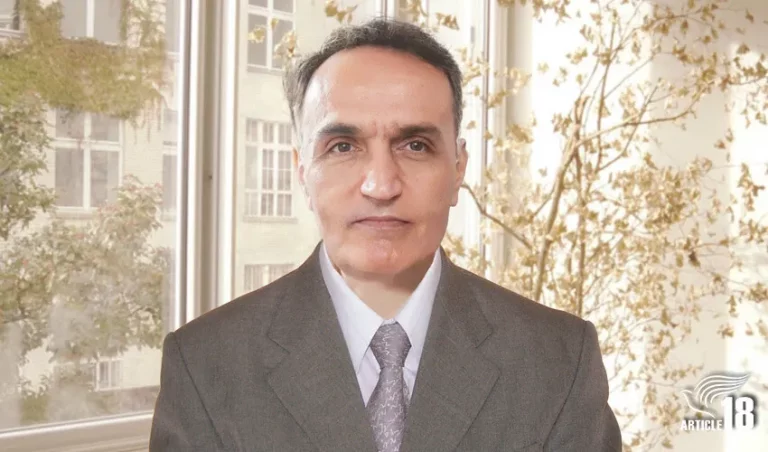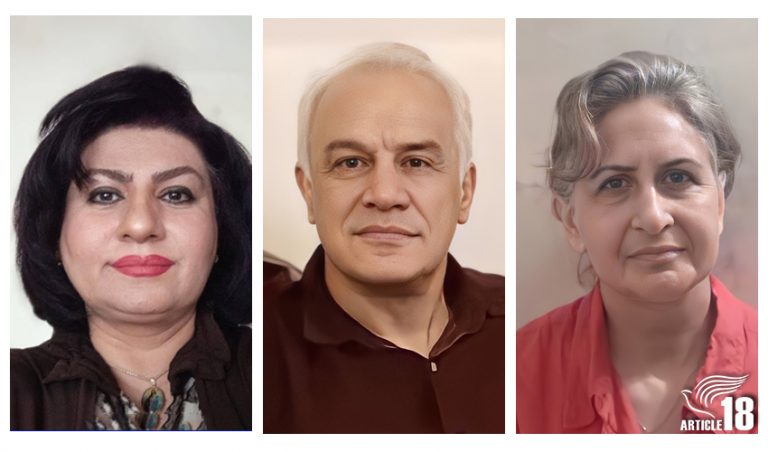
Case referenced by
Article18, The Mirror, Church in Chains, Premier Christian News, Voice of the Martyrs, Barnabas Aid
Summary
Mehdi Akbari, who is known as Yasser, was given a 10-year prison sentence in October 2020 for “acting against national security by forming a house-church”. He was released from prison in September 2024 after his sentence was reduced to four years and five months. In total, Yasser spent four years and nine months in prison.
Case in full
Yasser was first arrested on 30 January 2019 as part of a set of coordinated raids by intelligence agents on the homes of Christian converts in the Ariashahr area of Tehran.
Three other Christians, Simin Soheili, Mehdi Rokhparvar and Fatemeh Sharifi, were also arrested, and all four were transferred to Ward 2A of Evin Prison, where they were placed in solitary confinement and interrogated.
On 14 February 2019, Simin was released on bail of 800 million tomans ($62,500), having been warned she could face a 10-year prison sentence for “disturbing public order, propagating Christianity and connecting with foreign entities”. She was severely traumatised by her experiences.
The others were released on 18 March 2019 on the same bail amount.
They were tried on 16 June 2020 at Branch 28 of the Revolutionary Court in Tehran on charges of “acting against national security” and “forming an illegal evangelical Christian group” – under Article 498 of the Islamic Penal Code, relating to organisation of groups “hostile” to the regime.
The judge, Mohammad Moghiseh – who has earned the nickname the “Judge of Death” for his harsh treatment of prisoners of conscience – spoke obscenely to the Christians and would not listen to their defence, only citing the report of the intelligence agent.
He also accused them of “widespread association with missionary groups, as well as evangelical Christian groups outside the country – in Russia, Georgia, Turkey, and Armenia”.
He then increased their bail to 7 billion tomans ($220,000), saying: “Your actions are worthy of death! Who set this low bail amount for you, so you could be free to roam about on the streets?”
The two women were freed on bail, but the men were transferred to Evin Prison and their sentences were communicated to them there on 17 October 2020.
Yasser, Simin and Fatemeh were given 10-year sentences, and Mehdi five.
On 28 December 2021, Yasser, who was a single parent, was informed that his only son, 18-year-old Amir Ali, who had underlying health issues, had passed away at the care facility where he had been living since his father’s imprisonment. Yasser was given five days’ leave from 1 January 2022, but by that time his son’s funeral had already taken place. His leave was later extended to 10 days, but he was forced to return to Tehran’s Evin Prison on 12 January 2022.
On 29 September 2024, Yasser was released from prison after his sentence was reduced to four years and five months by Branch 21 of the Tehran appeal court. Yasser had already spent four years and nine months in prison, so he was released that same afternoon and met outside the prison by his family and also Mehdi Rokhparvar, who had been released from his own prison term a year prior.
During his nearly five years in prison, Yasser applied for a retrial with the Supreme Court on five occasions. His first four applications were rejected, but his final application, lodged in April 2024, was accepted, and Branch 39 of the Supreme Court ruled that the length of his sentence should be reviewed, leading ultimately to the reduction of his sentence and his release.
Recommendations
Article18 requests that the international community and Christians worldwide:
- Call for the immediate release of all Christians detained on charges related to the peaceful practice of their faith.
- Call for the swift application of due process in the cases of all who are detained and/or awaiting charges, trials, sentences or appeal hearings on account of their Christian faith and activities in Iran.
- Encourage Western countries to prioritise human rights in negotiations with Iran, especially freedom of religion or belief, and urge the government of Iran to recognise all minority-faith adherents, including converts to Christianity, as full citizens before the law, enjoying their full human rights.
- Call the international community to hold the Iranian government accountable for failing to uphold its international and constitutional commitments to protect the freedom of Christians in its territories. Closing churches, appropriating church property, arresting church leaders and threatening churchgoers are violations of freedom of religion or belief, as prescribed in Article 18 of the International Covenant on Civil and Political Rights, to which Iran is a signatory, without reservation, and therefore legally bound to uphold. Meanwhile, Article 13 of Iran’s Constitution states that Zoroastrians, Jews and Christians are recognised religious minorities, who are free to perform their religious rites and ceremonies. And Article 23 says “investigation of individuals’ beliefs is forbidden, and no-one may be molested or taken to task simply for holding a certain belief”.
Background
In July 2023, in a letter smuggled out of prison, Yasser wrote about his grief at the loss of his only son and his struggle to understand the reason for his imprisonment.
In the letter, Yasser said he carried his grief “like a suppressed cry and an unexpressed sorrow”.
He was also brutally honest about the difficulties he had faced since his arrest, such as being detained for a month in solitary confinement, denied access to a lawyer, and convicted in a five-minute sham trial.
The Christian convert said that even after three years in Tehran’s Evin Prison, he was still unable to understand how his membership of a house-church could have been viewed as an “action against national security”.
“Is worshipping God a crime?” he asked. “When I was accused of ‘action against the country’s security’, I did not have a lawyer to ask him about the meaning of this accusation and what crimes are included in the definition.”
Yasser said that before he was taken to the Revolutionary Court, he had thought “a fair judge, well aware of what constitutes a crime, especially the serious crime I was accused of, would examine the evidence presented before him and realise I have only worshipped God according to my Christian faith, permissible under Article 13 of the Iranian Constitution, and therefore acquit me of any crime and save me from prison. But what an illusion that was!”
Yasser described his court hearing as “hundreds of times worse than the interrogations”, explaining: “If the interrogators tried to impose one crime on me, in this court the judge attributed many more crimes to me that beforehand I could never have imagined.
“He labelled Christianity a ‘false sect’, of which he said I was a follower. He expanded the boundaries of criminalisation against me so ignorantly that he even mistakenly seemed to consider Jews and Christians as followers of the same religion. He declared me a follower of ‘the deviant religion of Christianity’, and also ‘a Jewish person affiliated to Israel’.
“Now that I have spent three years in prison, I still do not know how I was able to act against Iran’s national security by being a follower of Christ.
“Having no lawyer, I still don’t know how to defend myself within the framework of the law, considering what they did to me. I don’t know what to say if someone asked me how I acted against national security. I only know that I am, and will remain, a Christian, and that I will preach about the light of God and kingdom of heaven to everyone.”
Yasser said his experiences tormented his soul as well as his body, saying: “If a prisoner loses his faith, he will surely be crushed. When the night drags its black mantle over the prison, and the sadness sinks in with the sunset, the beats of the seconds of the clock hit like a whip in my mind, and I begin to wonder: I wonder if this faith of mine is worth enduring such pressures.
“Time and time again, I have found myself surrounded with these thoughts, and each time I have answered firmly: ‘Yes, of course it is worth it.’”
Yasser said he was shocked when the Court of Appeal and Supreme Court both confirmed the verdict against him, and said he hoped his imprisonment may at least make a difference to others.
“If my presence within these prison walls means that I would be the last prisoner of conscience, and causes other religious minorities of my country to be able to freely worship God according to their own faiths, as stipulated in Article 13 of the Constitution, then not only do I have no complaints but I accept it with love,” he wrote.
“Perhaps it is necessary for everyone to be made aware that, in my country, despite the laws and Constitution, they consider Christianity a ‘deviant faith’, and with no reason they consider worshipping God in this way to be a collusion with foreign governments, punishable by a judicial ruling.”
“Yes, it may be necessary,” he concluded, “but what else should I do from behind these walls? I do not know. Perhaps the truth should be told without exaggeration, so that everyone hears.”
Yasser also shared in his letter about his final moments with his son, writing:
“When Amir-Ali saw me in handcuffs and prison clothes, he was reassured that I had not abandoned him, even in such conditions. It was as though my son had endured his painful illness for just a little longer so we might have one final chance to meet, albeit in prison clothes and in the presence of officers.
“Due to the court order, I had to go back to my cell, but I consider the best moment of my life to be the last time I hugged my Amir-Ali.
“Two months later, Amir-Ali passed away. I mourned his loss in prison, and bemoaned my sense of remorse for not being by his bedside in his last moments. The prison authorities did not agree to a short leave from prison for me to attend Amir-Ali’s burial. Only a few days afterwards was I sent on leave for 10 days.”
A British-Iranian imprisoned alongside Yasser, Anoosheh Ashoori, described him as a “kind” and “fantastic human being”, whose “pain was in fact more severe than others” due to his son’s death.
“Amir Ali had many medical issues, and [Yasser] was not allowed to go and visit him,” Anoosheh explained. “And even when his condition became critical, and he was there begging the authorities to allow him to go and visit his son in the hospital, they didn’t.
“And after he passed away, it took quite a while before he was allowed to go to attend the funeral.”
Yasser’s release came just five days after the release of another Iranian Christian who had been serving a 10-year term, pastor Anooshavan Avedian, who was acquitted by the same court of appeal.
Article18’s director, Mansour Borji, commented: “We welcome the release both of Yasser and Anooshavan, for whom we have long campaigned and neither of whom should have spent even one day in prison. Both Yasser’s reduction of sentence and Anooshavan’s acquittal show clearly how arbitrary their sentences were in the first place, being questioned not only by independent lawyers but also now by the judges of Iran’s own Supreme Court, further demonstrating the baselessness of the accusations that have led these and other Christians to spend years of their lives behind bars.
“We call now for the immediate release of the other at least 20 Christians still in prison only on account of their beliefs and the peaceful outworking of these beliefs, such as Armenian citizen Hakop Gochumyan, who is also serving a 10-year sentence only because he visited some churches and was in possession of a handful of Bibles.
“Iran has for too long targeted Christians simply on account of their beliefs, while at the same time claiming on the world stage that ‘no-one is imprisoned for their beliefs’. The cases of Yasser, Anooshavan, Hakop and many others betray the falsehood of this claim. In reality, evangelical Christians and converts to Christianity, alongside other unrecognised religious groups, continue to be targeted only because of their beliefs. If the Islamic Republic of Iran really wants to build a reputation for being a place where no-one is imprisoned on account of their beliefs, it must immediately release all other religious prisoners of conscience, and fulfil its obligations as a signatory to the International Covenant on Civil and Political Rights, Article 18 of which enshrines religious freedom, including the freedoms to change one’s beliefs and to share them with others.”



0 Comments
Trackbacks/Pingbacks